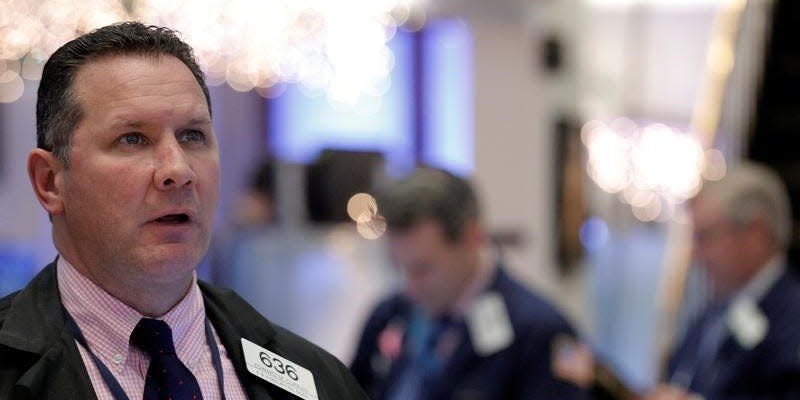From a 20% AI-fueled stock surge to tumbling market cap for Apple, here are UBS's biggest surprises for 2024

UBS' global equity strategy team shared 10 surprises it sees potentially in store in 2024.
Predictions include the S&P 500 surging 20% and the war in Ukraine coming to an end.
UBS also said Apple's market cap could tumble based on a number of headwinds.
With 2024 underway, the equity strategy team at UBS shared a forecast for the biggest surprises that could unfold through the rest of the year.
Strategists led by Andrew Garthwaite wrote in a note on Tuesday that its list constitutes calls with long odds, and that they are not the bank's base-case scenario or market consensus.
Among the surprises, UBS said China's nominal GDP could slow to 3% rather than accelerate, the yield curve could steepen to 2%, and a candidate other than Joe Biden or Donald Trump ends up winning the November election.
Here are the boldest predictions from the firm's report.
AI fuels a massive stock surge
This prediction doesn't look all that shocking given the rally so far in 2024 and the stunning earnings report delivered by Nvidia last week, which sent the whole market into a frenzy.
Generative artificial intelligence tools are already having a sizable impact on productivity, and the infrastructure for it to expand already exists, in the strategist's view.
They said it's possible AI can push productivity growth 2.5% higher — similar to the information communication technology revolution in the late 1990s — which could in turn spark a rally for equities.

Currently, the Fed and UBS economists assume that productivity will hover around 1.5%. But a 2.5% rate will mean inflation undershoots and unemployment will edge lower, which implies the central bank can cut rates faster than markets expect.
The analysts said that such a rise in productivity growth would fuel a 20% jump this year in the S&P 500.
"If it took, say, 3 years for this productivity increase to come through, then the upside for equities would be around 17%."
Peace in Ukraine
Another surprise the UBS team forecast is a potential peace deal in Ukraine. A critical market repercussion of that would be falling gas prices, which would then boost prospects for European bulk chemical companies, in the bank's view.
"For Europe as a whole, our economists highlight that 10% off the retail price of gas, oil and electricity would boost GDP growth by 0.2% and cause a 1pp fall in headline inflation (disproportionately helping the consumer)," the strategists said, adding that there could be a sell-off in defense stocks.
Germany, the largest economy in the eurozone, would benefit from lower energy prices as well as its exposure to Eastern Europe and Russia. Poland would also benefit as "the clear winner," UBS said, given its volume of exports pre-invasion with Russia and Ukraine.
UBS estimates that rebuilding Ukraine would require reconstruction efforts from the United Nations and European Commission of about $0.42 to $0.48 trillion, respectively.
"There would need to be a modern day equivalent of a Marshall Plan to help finance this, potentially aided by some form of war reparations (from frozen reserves)," strategists said. "This obviously would help cement stocks in particular and those capital goods companies who serve the real estate market."
Apple's market cap tumbles
On Wednesday, Apple stock hovered at about $182, down 5% year-to-date. UBS' surprise view, however, is that Apple stock could tumble to $130, which would bring its market cap to $2 trillion.
UBS noted that the iPhone maker trades on a "software multiple," even though 80% of its revenue comes from hardware.
UBS sees a handful of possible headwinds for Apple:
The smartphone cycle is mature, with 70% penetration globally
No presence in foldable products and "no obvious AI strategy"
Apple's earning momentum is weakest among the Magnificent Seven names besides Tesla
Demand weakness in China stemming from political or economic reasons
To be sure, the current UBS house view is a neutral rating on the company, with a price target of $190, which implies a $2.9 trillion market cap.
Read the original article on Business Insider

 Yahoo Finance
Yahoo Finance 